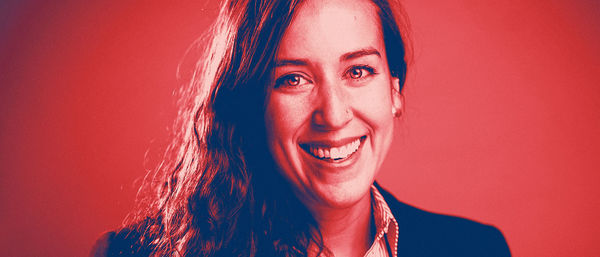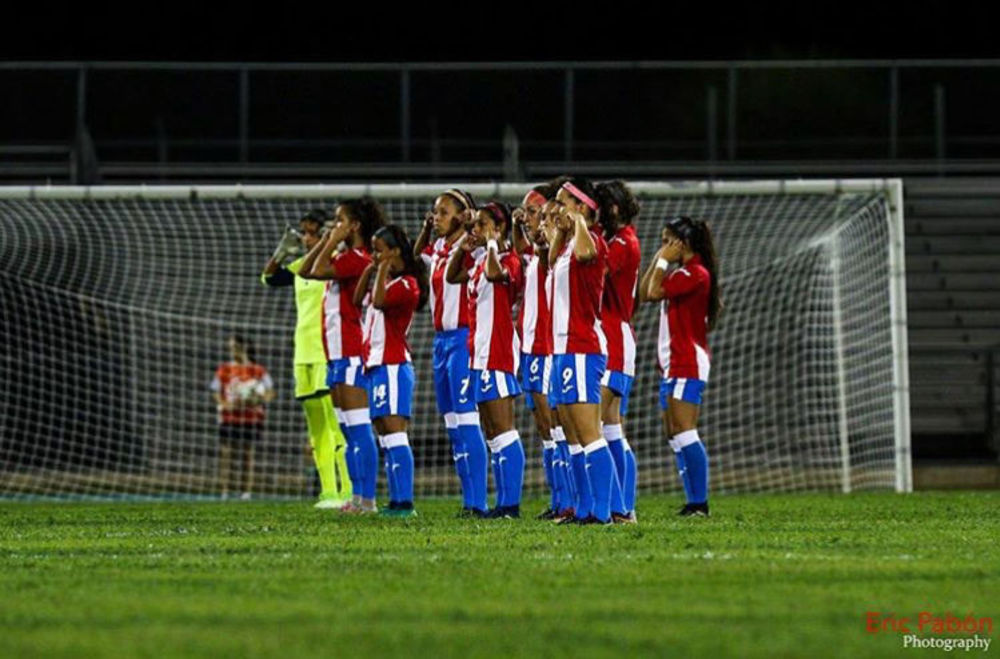
Nicole Rodriguez ’14, one of the most experienced members of the Puerto Rican national women’s soccer team, has always dreamt of a future in which female soccer players on the island are treated as equals to their male counterparts. Better yet, she’s been avidly working to make that dream come true.
It’s an issue that has gained attention in the United States — particularly over the past year — because of the spotlight shone on the American version of the issue. The U.S. women’s national team is the most successful national program in the world, winning four Women’s World Cup titles, four Olympic gold medals, and eight CONCACAF Gold Cups. Yet, over the years the team has come to be known more for leading the fight for equal pay and rights for female athletes than for its world titles. The challenge is even greater for teams in countries and regions that haven’t experienced the same kind of success. Rodriguez and her team help to provide insights into this reality.
A Connecticut native with Puerto Rican parents, Rodriguez spent her freshman year playing at UConn before transferring to Notre Dame and graduating a semester early. It was an easy move, as Notre Dame was at the top of the list of schools that would allow her to compete at a high level on the soccer field and also set her up for a prosperous future with a strong educational foundation. She credits her time on campus for teaching her to think critically and driving her to ask the important questions in her life.
“I think those two-and-a-half years were where I grew the most,” she said. “Especially my junior year, in my classes my professors really challenged me to consider my preconceived notions about different subjects as well as what is outside in the world and what are you willing to fight for. And how you should challenge the status quo, and questions like that that I think set me up to then later on be able to actually do that in real life and not be afraid to ask questions.”
As a sophomore in high school, Rodriguez tried out for the U17 World Cup qualifying team and ended up returning in the summer after the coach asked her to see if she’d make it past the final cuts. She did, and has since served as the captain of the U20 team and now is a veteran member of the full national team.
Rodriguez is thankful for every experience she’s had with the national team but notes that, early on, neither she nor her fellow teammates and their parents were aware of the inequality in women’s soccer that was just starting to gain more attention on an international scale. Her youth and excitement for the opportunity to play for the national team clouded her vision.
After gaining experience at Notre Dame and professionally, Rodriguez began to recognize major flaws in the way the Puerto Rican Soccer Federation was treating the women’s team.
“I started to ask questions and my teammates and I got together and decided after talking that this wasn’t right. … The conditions that we were in, and the lack of monetary support and abuses and manipulations from coaches in the federation just wasn’t right,” Rodriguez said.
The federation’s inattention to the Puerto Rican women’s team included years between scheduled friendly matches, disparity in pay between the federation’s men’s and women’s teams and the firing and replacement of several coaches –– including Shek Borkowski, whose 2018 dismissal effectively shut the women’s program down for the year.
“We knew that that’s not what we wanted as our legacy to leave in Puerto Rico, and that we only have a limited time to play and so we want to make sure that we’re leaving soccer on the island in a better state than how we experienced it,” Rodriguez stated.
After doing some research, she and her teammates noticed that the issues they were combatting in Puerto Rico were prevalent throughout the world.
After some quick deliberations, the women decided that it was necessary for them to fight, not only for themselves, but for those who would come after them.
Fight is what they did. During the opening kickoff of a friendly match against Argentina in September 2018, all of the starters and bench players on the Puerto Rican side stood in front of a record crowd of over 4,000 people and took part in an organized protest against the lack of support from the federation. The women stood with their fingers pointed at their ears in silent protest representing the federation’s disregard for the players’ needs. The Argentinian team had faced its own struggles with its own federation and allowed Puerto Rico to carry out the protest by kicking the ball out of bounds once the game began.

“For example, in Afghanistan there was sexual abuse and threats of families being killed and things like that from their federation. I think that helped me get a clear understanding of what it means to advocate for equal opportunities and better conditions and how I can then talk to my teammates and talk to other people about that so it’s not just an isolated event and we can keep it going.”
“What I realized at that conference, it was really crazy to hear all the things that are happening around the world in sports, but what I realized there is that we’re not alone and there are some countries where the abuses of power are incredibly terrible,” Rodriguez said.
After the on-field protest in September, Rodriguez was invited to speak at the third annual Sporting Chance Forum in 2018 in Paris. At the conference, hosted by UNESCO, the Centre for Sport and Human Rights and the Institute for Human Rights and Business, over 250 delegates across a wide range of affected groups, sports bodies and sponsors gathered “to drive progress toward a world of sport that fully respects human rights.”“What we really wanted that to do is for people to ask questions, and people did. … People all over the world were reaching out to us, seeing how they could help, seeing what could happen and that kind of lit a fire under the federation because we had never gotten that much attention ever,” Rodriguez said.
Rodriguez and her team’s efforts have not been futile, as she affirmed. Rodriguez and her teammates succeeded in replacing president Eric Labrador, who had led the federation since 2011, with Iván Rivera in 2019, and a team member now sits on the federation’s board. They continue to work toward better field conditions and pay, but are confident in the steps they’ve taken to achieve progress.
“It’s definitely a long process, it takes a lot of time, but I think we’re making good steps,” Rodriguez said.
Rodriguez, now a teacher in Colorado, still plays for Puerto Rico and continues to promote change from within by maintaining a dialogue with the federation and staying connected with others to ensure proper steps are taken to implement change. Spreading awareness is also still a major piece of the puzzle for Rodriguez. The island is still recovering from the destruction caused by a pair of Category 5 hurricanes that hit within two weeks of each other in September 2017, and the 6.4 magnitude earthquake that shook the territory in January of this year. Thousands of Puerto Ricans are without adequate power, food or water, and even those disasters receive little international support or coverage. Unfortunately, the same applies for Rodriguez and her teammates’ fight for justice, but that won’t stop them from continuing to work toward positive change.
Rodriguez and her teammates are battling an issue that is present across the globe, one that has only recently begun to gain awareness. That’s the legacy that they will eventually leave behind, a team that fought for something greater than itself.
Originally published by at weare.nd.edu on March 02, 2020.